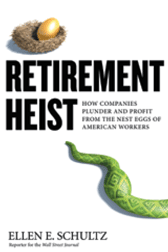This article is from Dollars & Sense: Real World Economics, available at http://www.dollarsandsense.org

This article is from the January/February 2012 issue of Dollars & Sense magazine.
Subscribe Now
at a 30% discount.

An Occupational Hazard
Review of Retirement Heist by Ellen E. Schultz. Portfolio/Penguin, 2011.
People involved with the movement begun by Occupy Wall Street are rightly incensed about indefensible corporate behavior. But when a writer for the Wall Street Journal gets angry about corporate malfeasance, that is man-bites-dog news.
Ellen Schultz has covered corporate pensions for the Journal since 1990. Retirement Heist replicates and extends her award-winning reportage.
The retirement crisis, as Schultz points out, has nothing to do with an aging population or poor returns on employee pension funds. Rather, the real problem is that corporations have plundered worker pensions to improve their bottom line, increase company stock prices, and boost executive pay.
In case after case, Schultz documents the many ways corporations have cut retirement benefits and movingly describes their consequences. The result is a tale of worker abuse by the top .1% (yes, Occupy Wall Street forgot the decimal point).
As pensions for ordinary workers were cut, pensions for senior executives have soared. Omnicare froze worker pensions in 2010, but gave CEO Joel Gemunder a $130 million retirement payment. For some reason, this is never regarded as a drain on the firm.
To lower their pension obligations, firms will lay off workers just before their pension benefits are about to spike due to higher salaries. Sometimes firms develop a new retirement program that keeps average benefits the same. However, more benefits will go to young workers likely to leave the firm before becoming vested (leaving cash on the table for employers), and less will go to those near retirement.
Another trick is to offer employees a lump-sum payment lower than their pension&srquo;s actuarial value. Workers are not generally in a position to know this, and cash in hand is usually hard to resist.
Even worse, many firms use pension money to gamble on the stock market. If the market rises, they take money out or contribute less, improving their bottom line; if it falls, they use financial problems as an excuse to cut benefits.
Perhaps the most egregious abuse involves re-estimating employee retirement benefits at a lower amount, thereby forcing employees to figure out if there is a mistake in the new calculation and then forcing them to go to court to contest the error. With no punitive damages possible, nor court costs for those who bring suit and win, employers have nothing to lose by denying workers the retirement benefits that they earned during their working lives.
Overall, the legal system works against retirees. Bankruptcy law puts creditors and banks ahead of vested workers for firm funds. While workers usually lose their pensions, top executives have their pensions protected in bankruptcy-proof trusts.
Schultz claims that the death blow to pensions came in 1987. Under new accounting rules, cutting benefits would reduce pension liabilities on corporate balance sheets and increase profits. In addition, any excess over expected future payments gets counted as earnings. Pension management soon became a means to manage corporate earnings—sometimes by changing assumptions about life expectancy and future returns, and sometimes by cutting pension benefits.
In addition to pensions, and for similar reasons, death benefits and retiree health benefits have been clawed back.
Many firms promised to pay retiree health benefits until they were eligible for Medicare and funded this future expense. Then they assumed higher inflation and greater longevity, creating a phony crisis that they used to justify cutting benefits, or eliminating them altogether. Unless covered by a union contract, retiree health benefits (unlike pensions) are not protected; firms can break their promises at will.
Although it contains a powerful indictment of worker benefits stolen by corporate greed, Retirement Heist has many problems. First, it fails to connect the many stories of corporate excess. There is no history of U.S. retirement programs—their rules, rule changes, and the good they have done. Nor does the book explain how pension consultants infiltrated corporate boardrooms and perpetrated the plunder of retiree benefits.
Second, Schultz&srquo;s prose can get very convoluted. It is often difficult to follow her account of the tax and legal maneuverings employed by large firms to deny or reduce retirement benefits.
Finally, she offers no solutions. Like the Occupy movement, there is justifiable anger about corporate abuses but no explicit demands about what to do about them. Nonetheless, both struggles are worth the effort.
Did you find this article useful? Please consider supporting our work by donating or subscribing.
